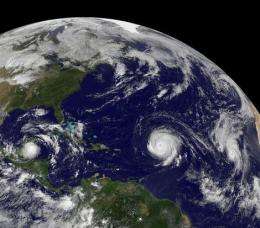Computer users simulate extreme weather at home

(PhysOrg.com) -- Volunteers are being asked to run a series of climate prediction experiments on their computers to help understand how global climate change will affect weather in different regions of the world.
The weatherathome.net experiment, which is launched today, will build on results from existing climate models to create more detailed simulations of weather changes, initially in three regions: Europe, the Western United States, and Southern Africa.
This new experiment, developed by Oxford University and the UK Met Office, and supported by Microsoft Research, uses a ‘regional climate model’ which provides information on weather events in much finer detail than is typically provided by global climate models. Because of the large amount of computing power required, the regional model covers only a limited area and is supplied with values of weather variables, such as winds, temperature and humidity, around its edges so that it feels the influence of large-scale weather in other parts of the world.
‘Regional models add the detail of how different types of weather will change to the background of broad-scale changes provided by global models,’ said Richard Jones, Head of Regional Modelling at the Met Office who led the development of the new experiment. ‘Watching them run you can see how weather fronts and local features such as mountains interact to produce extreme rainfall.’
To take part volunteers download software from weatherathome.net and then run 'two models in one' using the spare capacity from their home computers: a global model, to simulate large-scale weather, and an embedded regional model, to simulate detailed events in a specific part of the world.
Results from the different regions will be sent directly to scientists specialising in the climates of those regions for analysis: the European region will be analysed by Oxford University and the Met Office, the Western USA by Oregon State University, and Southern Africa by the University of Cape Town.
Weatherathome.net is the latest experiment to be launched by the climateprediction.net project, which since it began in 2003 has used computing resources donated by hundreds of thousands of volunteers to explore the uncertainties in global climate predictions in unprecedented depth.
Understanding the impact of climate change on extreme weather events is challenging for two reasons: First, the models used for simulating global climate change still do not resolve many of the features responsible for such events, such as the weather fronts associated with storms and intense rainfall. Secondly, since extreme weather events are, by definition, rare, many model-years of simulation are required in order to gather reliable statistics.
‘It is like trying to work out if a roulette wheel is truly fair and random: you have to watch the wheel spin thousands of times to work out if some numbers are coming up zero more often than they should,’ said Dr Myles Allen of Oxford University’s Department of Physics, principal investigator of climateprediction.net
This project is also about exploring the limitations of current climate models and the project team is releasing the first of two information packs to ensure results are interpreted realistically.
‘Climate models are not crystal balls, but they can be useful tools provided people understand the uncertainties,’ said Neil Massey of Oxford University, technical coordinator of climateprediction.net Marion Manton, at Oxford University’s Department for Continuing Education and project leader of this climateeducation.net initiative, adds: ‘Anyone can use these information packs to learn about how climate simulation works, and potential users can explore how - and how not - to use model results in planning how to adapt to climate change.’
Provided by Oxford University














